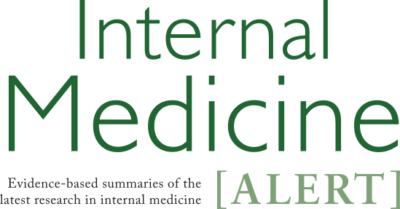
Internal Medicine Alert – July 15, 2004
July 15, 2004
View Issues
-
Human Bites: Facts and Fiction
Infection rates in low-risk human bites are exceedingly low. Antibiotic treatment may not be necessary for these patients. -
Much More About CRP!
CRP values as a continuous variable have independent predictive value for subsequent coronary events in apparently healthy women. -
Laparoscopy for Primary Colorectal Cancer Resection
In a prospective, randomized trial, primary excision of colorectal carcinomas by laparoscopic surgery was compared with laparotomy. Disease recurrence and 5-year survival were not significantly different in the 2 groups. Operative time was greater for those receiving laparoscopic approach but post-operative recovery and hospital stays were shorter. -
Pharmacology Update: Rifaximin Tablets (XifaxanTM)
The first nonabsorbable, gastrointestinal-selective antibiotic has been approved for the treatment of travelers diarrhea caused by noninvasive strains of Escherichia coli. -
Clinical Briefs
Prevention of Disabling and Fatal Strokes by Successful Carotid Endarterectomy in Patients without Recent Neurological Symptoms; Cox-2 Inhibitors vs Nonselective NSAIDs and CHF Outcomes in Elderly Patients; Interventions for the Prevention of Falls in Older Adults -
ECG Review: "Torsades Fabriquées"?
The 12-lead ECG and accompanying rhythm strip shown in the Figure were obtained from an older man who presented with acute dyspnea from pneumonia. He was on multiple medications, and was in moderate-to-severe respiratory distress at the time this ECG was recorded. Is the rhythm Torsades de Pointes? -
Pharmacology Watch: Britain to Allow Over-the-Counter Sales of Zocor
The British government will soon allow over-the-counter (OTC) sales of Mercks simvastatin (Zocor), marking the first time any country has allowed the OTC sale of a statin. -
Helicobacter pylori Infection and Eradication on Heartburn and Gastroesophageal Reflux
Eradication of H. pylori in a large outpatient general practice setting seemed to protect against the subsequent onset of gastroesophageal reflux disease (GERD), and there was evidence that eradication of H. pylori neither improved nor worsened pre-existing GERD symptoms.
